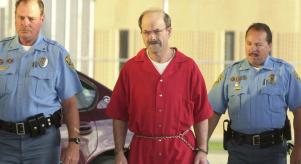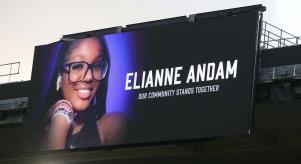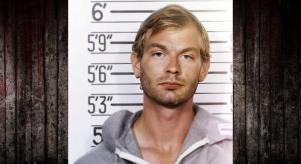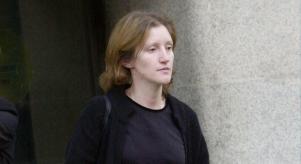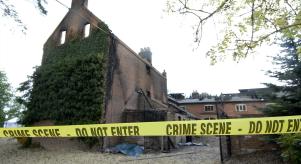
Who Killed Jill Dando? 3 compelling theories
The murder of popular British TV presenter Jill Dando is one of the most famous unsolved cases in the U.K. and this year marks the 23rd anniversary since her death.
On 26 April 1999, at approximately 11:30 am, 37-year-old Dando returned to her house in Fulham after spending the night at her fiancé’s home in Chiswick. As she approached her front door a man grabbed her from behind, forced her to the ground and shot her in the head with a 9mm calibre semi-automatic pistol.
The talented and much-loved presenter had fronted the Six O'Clock News, BBC Breakfast News and primetime shows such asHoliday andCrimewatch and her killing shocked the nation. The police launched a huge investigation, interviewed hundreds of people and opened up thousands of lines of enquiries, which resulted in the conviction of a man named Barry George in July 2001.
The prosecution’s main piece of evidence was a single particle of gunpowder that was found in the pocket of one of George’s coats. The particle matched those found at the crime scene but years later doubt was cast over its validity as a definitive piece of evidence, since it could have come from a multitude of sources. Speaking during a recent BBC documentary The Murder of Jill Dando, forensic scientist Angela Shaw said, ‘1-100 people might pick up a particle unknowingly. A single particle a year later in a coat pocket could not link Barry George to the shooting.’
Seven years after his conviction George was acquitted of Dando’s murder. In the same BBC documentary Hamish Campbell, the senior investigating officer on the Dando case, stated that he did not believe her killer would ever be found and brought to justice.
So who did kill Jill Dando? We take a look at the main theories.
1. Serbian hitman
It was one of the proposed theories put forward by the defence team during the trial of Barry George in 2001. As part of Operation Allied Force during the Kosovo War, NATO bombed the Radio Television of Serbia (RTS) Headquarters in Belgrade just three days before Dando was killed. RTS was a key propaganda tool for Serbian leader Slobodan Milošević. The bombing had left 16 employees of RTS dead and many have speculated that Dando was killed in retribution for these deaths.
Just a few weeks earlier, Dando had fronted a BBC appeal for aid for the Kosovan-Albanian refugees fleeing ethnic cleansing in the Balkans. This exposure could well have brought her to the attention of the Serb leaders. This theory is seemingly backed up by two other events. The first came just one day after Dando had been killed. Tony Hall, the then BBC Head of News, had to go into police protection after receiving a death threat from a man over the phone. The caller claimed to be a Serbian activist and declared that he had killed Dando and that Hall would be next.
The second event occurred a few days before Dando’s murder. Slavko Curuvija, an opposition journalist, was assassinated outside his home in Belgrade and the method used was identical to Dando’s case. In 2012, Branka Prpa, the widow of Curuvija came forward and declared, ‘I think there is a link between Dando and Curuvija. I think they were both executed.’
Further adding weight to this theory was the fact the bullet casing discovered at the scene showed signs of ‘crimping’, which were apparently similar to markings on Yugoslav ammunition.
However, no solid evidence has ever been produced to prove the Serbian connection and the prosecution in the 2001 trial of Barry George dismissed it as ‘utter nonsense.’ Many others dispute the theory, including John Simpson, the world affairs editor of the BBC. He was in Belgrade covering the NATO bombing campaign at the time of Dando’s death and believes he would have been an easier target than Dando back in England.
Others have called into question the fact that the killing was never claimed publicly by a credible source, something that would have been the case if it were a politically motivated attack.
2. Gangland killing
At first appearances, the killing of Dando seemed to have been carried out by a professional. The defence team in 2001 declared that Dando had been killed by a ‘highly efficient’ hit. They believed the single shot, the muffled sound of the gun and the clean escape in broad daylight had all the trademarks of an assassin.
Mark Williams-Thomas, an investigative journalist and former police officer, famous for exposing Jimmy Savile as a paedophile, recently claimed that an anonymous hitman had told him that he knew the criminal behind the killing but was too afraid to publicly name him out of fear.
Jill was gunned down on the orders of a London underworld Mr Big...
Williams-Thomas further added that after investigating the case himself he believed Dando was killed by a professional on the orders of a London based mob boss, ‘My theory is that Jill was gunned down on the orders of a London underworld Mr Big to send out a direct, bloody message to others: "Do not take on organised crime."’
Certainly the defence in 2001 also believed that Dando’s work onCrimewatch could well have been the reason she became a target, with the defence barrister claiming, ‘Plainly an aggrieved individual who believed that this programme was itself providing an effective aid to police investigation and needed to be curtailed might consider, however misguidedly, that a literal warning shot across the bows was required.’
However, both theCrimewatch link and the professionalism of the attack have been called into question. Firstly the spent cartridge from the single shot was left at the crime scene, something a professional would never do. The weapon used was also believed to have been something like a modified starting pistol or a reactivated fireman with a low muzzle velocity, again something a professional would not usually use. The location and time of attack also had too many variables for a professional to consider. The fact that Dando spent most of her time at her fiancés house and very little at her own place meant that her house was hardly the most reliable location to find her.
With regards to theCrimewatch link, the police looked at all the cases that Dando had been involved in. Speaking during the BBC documentary, Hamish Campbell said, ‘How would it be served by somebody onCrimewatch, some villain or criminal going, “I know what, I’m so upset with this, I’m going to kill Jill Dando”? That made no sense at all. We examined all the [Crimewatch] cases that Jill was involved in, which cases she broadcast…there was simply no evidence for it. ‘
Others have also called into question the motivation of hiring a hitman for the purposes of killing a TV presenter. Surely an aggrieved criminal would seek revenge on the policeman or the informant who gave them up rather than the messenger?
3. Stalker/obsessive fan
One of the earliest theories adopted by the police was that a stalker or an obsessed fan had killed Dando.
The seemingly opportunistic nature of her killing might well make this one of the strongest theories. A stalker, rather than a hitman, is more likely to use a makeshift weapon and attack someone outside his or her front door in broad daylight. The prosecution in the 2001 trial used this theory as the basis of their case against George stating, ‘Unusual as they may be, there are some cases where there is no single motive. How could there be a reason for killing Jill Dando? Sadly, not everyone in the world is rational, logical and sensible. There is a dark, complex side to some people's minds which causes them to act in a dreadfully destructive way for no rational reason.’
Shortly before her death, Dando had announced her engagement to Alan Farthing. Could this have been the reason why she was attacked, her stalker trying to prevent her from marrying someone else? Certainly, a man was seen by multiple witnesses loitering around Dando’s street the night before her murder and on the morning of.
On the flip side of this theory, no famous person has ever been killed by a stalker or an obsessed fan in the UK and the police did identify, question and eliminate 140 people who had been flagged as being obsessed or having an unhealthy interest in Dando.
